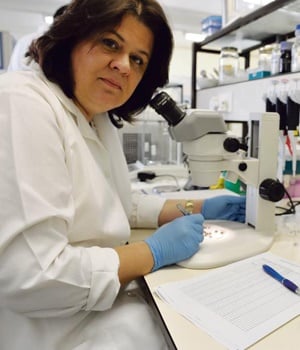
Even dinosaurs were bitten by ticks, proving the tenacity of the tiny bugs, says Professor Christine Maritz-Olivier as we sit in her tiny, homely office at the University of Pretoria’s faculty of veterinary science in Onderstepoort.
Surrounding her office are small laboratories. It is from here that a worldwide battle is being waged on many fronts against the parasites that, at one stage, might have threatened our food security.
That they no longer do so is due to the dedicated work and research done by Maritz-Olivier. She is associated with the department of genetics, natural and agricultural sciences at the university.
She developed a unique, injectable livestock tick vaccine that was evaluated at the university’s biological research centre at the Onderstepoort Veterinary Academic Hospital for the first time in 2012.
“It kills about 70% of the ticks on an animal,” says this exceptional woman, who endangered her health recently by working at the pace she does.
She chuckles a little sheepishly, her empathy and warmth evident from the moment I arrive.
I am amazed to see that she answers all telephone calls and deals with correspondence herself.
“We aim to optimise the vaccines so we can inject cattle once or twice a year with the vaccine in the same way we use flu vaccines on ourselves every year,” she explains.
The importance of her work is dramatically illustrated by horrible tick-borne diseases, such as east coast fever, which can halve a herd within a week of infection.
“Sometimes a farmer has to shoot all his cattle because it is such a devastating disease,” says the professor.
Historically, farmers have used dips to control tick infestations.
“But the common blue tick species, such as the Rhipicephalus microplus found on cattle, is becoming resistant to the normally used dips such as Amitraz and synthetic pyrethroids,” says Maritz-Olivier.
This tick causes redwater fever (babesiosis) and gall sickness (anaplasmosis).
“When animals and humans are bitten, the redwater parasite invades the red blood cells, multiplies and destroys them, resulting in anaemia that can kill.”
Under a microscope, the Babesia parasite looks much like the malaria-causing parasite plasmodium because they both belong to the same family of parasites.
“As a result, we’re beginning to test antimalaria drugs on the Babesia parasites. We hope to find a new drug that will treat both types of parasite,” she says.
Maritz-Olivier has seen tens of thousands of ticks on one cow on farms in Mpumalanga, “and I know it will die. Yet for a rural farmer, that cow represents everything to him – meat, milk and wealth.”
So desperate are these struggling farmers that they pour petrol or Jik over their cattle in an effort to kill the parasites, “and then they milk them an hour later. I’ve seen this first-hand because I work so closely with them.”
It was the sight of a calf lying dying from redwater fever, which had been particularly lively and healthy only hours before, that galvanised the professor into starting a new pillar of research, focusing only on this parasite.
“I fought through the night, alongside a vet, for that calf’s life. It survived with blood transfusions and medication, but few small-scale farmers can afford such treatment.”
As Maritz-Olivier worked on developing an improved redwater drug, she learnt that people could contract the disease. Those who died were usually the elderly and those with compromised immune systems.
Due to the similarity between malaria and redwater parasites, “we’re starting a new project next year, which we hope government will fund in order to screen patients described as ‘malaria drug resistant’. They are treated repeatedly for malaria, but do not respond.”
Maritz-Olivier is hoping her tick and tick-borne diseases programme can develop a DNA test to establish the cause of a patient’s disease.
“We’ll be the first laboratory to work on such a test in Africa, and we’re starting on patients in Mpumalanga.”
The health implications of Babesia on immune-compromised people apply throughout South Africa, but particularly in that province.
“It’s a malaria area and, additionally, there is HIV, a large rural population, ticks resistant to cattle dips and poverty.”
The latter is a condition the professor understands well. She grew up in a poor family. Her father died when she and her two siblings were young, leaving their mother to raise them alone.
After Maritz-Olivier matriculated with a passion for biochemistry, she took out a loan to study at Tukkies. She often worked through the night to support herself financially by doing routine blood tests at pathology laboratories.
She obtained her PhD – on the salivary glands of the soft tick – in 2005 and for the next five years completed a UK-funded Wellcome Trust postdoctoral fellowship.
“The trust focused on ticks in Africa and was the first world-funded group to concentrate on the parasites,” she says.
She did most of her work at Utrecht University in the Netherlands, flying to Pretoria and back as she worked on the breakthrough vaccine for the common blue tick.
The professor has been showered with international awards for her work, particularly in the US, and has presented her research findings at 28 international conferences.
Next year, she will assume the presidency of the International Society for Tropical and Veterinary Medicine in Berlin. She also co-chairs, with Dr Theo Schetter from the Netherlands, the International Ticks Vaccine consortium, which is supported by the Bill & Melinda Gates Foundation.
This wife of another busy Tukkies scientist, Nicky Olivier, and mother of their son (9) smiles ruefully when the word ‘relax’ is mentioned, before saying she does yoga and reads.
As we leave the Onderstepoort farm, the humble professor pats a cow and heads back to her tiny office.




 Publications
Publications
 Partners
Partners








